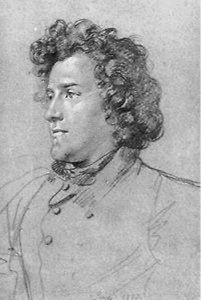Swan-song
(Poet's title: Schwanengesang)
Set by Schubert:
D 744
[probably autumn 1822]
Wie klag ich’s aus
Das Sterbegefühl,
Das auflösend
Durch die Glieder rinnt,
Wie sing ich’s aus
Das Werdegefühl,
Das erlösend
Dich, o Geist! anweht?
Er klagt’, er sang
Vernichtungsbang,
Verklärungsfroh,
Bis das Leben floh.
Das bedeutet des Schwanen Gesang.
“How shall I express this lament,
This sensation of death
Which dissolves
As it courses through my limbs?
How shall I express in song
This sensation of becoming
Which releases
You, oh spirit, as it blows?”
He lamented, he sang,
Fearful of annihilation,
Ecstatic with transfiguration,
Until life fled.
That is the meaning of the swan’s song!
All translations into English that appear on this website, unless otherwise stated, are by Malcolm Wren. You are free to use them on condition that you acknowledge Malcolm Wren as the translator and schubertsong.uk as the source. Unless otherwise stated, the comments and essays that appear after the texts and translations are by Malcolm Wren and are © Copyright.
☙
Themes and images in this text:
Farewell and leave taking Laments, elegies and mourning Swans Swan songs
According to Plato (Phaedo), one of the arguments Socrates used in taking farewell to his own life was based on the myth of the swans singing their most beautiful songs at the end of their lives.
It is quite wrong for human beings to make out that the swans sing their song as an expression of grief at their approaching end; people who say this are misled by their own fear of death, and fail to reflect that no bird sings when it is hungry or cold or distressed in any other way; not even the nightingale or swallow or hoopoe, whose song is supposed to be a lament. In my opinion neither they nor the swans sing because they are sad. I believe that the swans, belonging as they do to Apollo, have prophetic powers and sing because they know the good things that await them in the unseen world; and they are happier on that day than they have ever been before. (Plato, Phaedo 85. English translation by Hugh Tredennick.)
This report of Socrates’ own ‘swan-song’ as he prepared to drink the hemlock ascribes a rare certainty to a thinker who was more famous for his questions than his answers. However, it does capture an essential point, which is also central to Senn’s poem: humans cannot fully know why the swans are singing. Everything we ‘hear’ is an interpretation.
Senn manages to capture the two extreme interpretations that Socrates refers to (the swan-song can be heard either as a lament or as a cry of joy and ecstasy) and combines them. The swan is at the same time fearful of annihilation and ecstatic with transfiguration. It is both dying and being born. Death both extinguishes and releases its spirit.
☙
Original Spelling and notes on the text Schwanengesang »Wie klag' ich's aus Das Sterbegefühl, Das auflösend Durch die Glieder rinnt? Wie sing' ich's aus Das Werdegefühl, Das erlösend Dich, o Geist, anweht?« Er klagt', er sang1 Vernichtungsbang, Verklärungsfroh, Bis das Leben floh. Das bedeutet2 des Schwanen Gesang! 1 When the poem was published in 1838 this line read: 'Es klagt', es sang' (It lamented, it sang) not 'Er klagt', er sang' (He lamented, he sang) 2 When the poem was published in 1838 the word here was 'ist' (is) not 'bedeutet' (is the meaning of)
Confirmed by Peter Rastl with Gedichte von Johann Senn. Innsbruck, in der Wagner’schen Buchhandlung. 1838, page 15
Note: Schubert received Senn’s poem in handwritten form. Senn issued it later in the book mentioned above, with the footnote In Musik gesetzt von Fr. Schubert (Set to music by Fr. Schubert).
To see an early edition of the text, go to page 15 [19 von 168] here: http://digital.onb.ac.at/OnbViewer/viewer.faces?doc=ABO_%2BZ165653202


